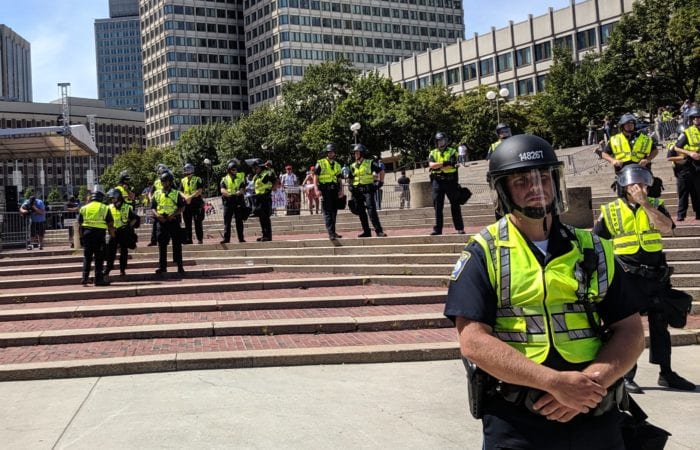
“The BPD threat in play is, frankly, nothing less than an insidious and blatant attempt to scare and silence young activists.”
Last week, students attending some Boston-area colleges received an email from the Boston Police Department, specifically from Commissioner William Gross. The note states that the BPD is committed to the safety of students, and asks those who are participating in protests to act in a way that would “make your school, your family, and your city proud.”
To the BPD, I say: You first.
In this letter to students is also a veiled threat. The commissioner writes:
Student behavior off campus will be regarded the same as if it were on campus. Any student behaving in a way that warrants the intervention of police will also be referred to their respective Dean of Students for appropriate discipline.
In other words: Mess with us, and we mess with your education.
Boston cops have had multiple instances of abuse and misconduct. Underlining that point, last month Suffolk County District Attorney Rachael Rollins released a list of 136 police officers who “have been accused of discrimination, corruption or other misconduct that could undermine their credibility as court witnesses.” Of the bunch, 115 names were added in the past year; 54 of them are from the BPD.
I find it rich that an institution which has blatantly disrespected its community, acted as if it is untouchable, and caused visible harm is now asking those it has wronged to behave in a way that makes their city proud. The department has hardly upheld that same standard. I am certainly not proud of BPD; I am angry, distrustful, and at best, skeptical of their motives. I know many others feel the same.
Looking elsewhere with alarm, last week in Florida Gov. Ron DeSantis proposed measures that would “make felonies out of participating in protests that result in property damage or blocking roads, and anyone who organizes or donates money to protesters would risk liability under the state’s racketeering laws.” To make matters worse, felons are largely disenfranchised in Florida, their rights still not restored after serving a sentence.
In Massachusetts, people who have been found guilty of committing felonies can have their voting rights restored after leaving prison, but they cannot vote while incarcerated. Still, with legislation like that proposed by DeSantis being introduced in multiple states and at the municipal level in some places, and considering that the rights of protesters are being routinely violated nationwide, it’s easy to fear a slippery slope.
All things considered, the BPD’s letter to students, while seemingly inconsequential in another context, is far more important than it may appear. At this point, we have all witnessed how protests often become violent after the police show up—when they fail to de-escalate, when they arrive in militarized gear, and when they antagonize protesters. There is no guarantee that if a demonstration “warrants the intervention of police,” that their response will be rooted in reality. And so, the commissioner’s threat sets a precarious precedent.
If the police decide that you are out of line, if you flip them off, maybe if you just mind your business and exercise your right to protest in a way they do not like, maybe they’ll decide to intervene. They have the power to essentially decide if your school will punish you for protesting, even if young people are doing their duty as citizens, showing up and expressing their anger at a system that has failed them and so many others.
The BPD threat in play is, frankly, nothing less than an insidious and blatant attempt to scare and silence young activists. I implore Boston schools: Don’t play along. Protect your students, and do not succumb to the pressure to work with police. Take the information they give you, and do nothing with or about it.
Young people need to know that they have the power and freedom to speak their minds, to utilize the knowledge their educational institutions provide, and to exercise their rights. If we don’t make it clear that we’re on their side, then we all lose.
Heidy Salama is a 23 year-old, daughter of Egyptian immigrants, and a cat mom living in the North Shore. She studied journalism at University of Massachusetts Amherst.

